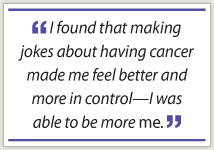 Despite a strong family history of colon cancer—all five of my mother’s siblings had colon cancer, and my mother died of the disease 10 years ago—when some flecks of blood started showing up on my toilet tissue in early 2005, I figured it was from hemorrhoids. At 38, I was a marathon runner and in great shape, and although I didn’t feel quite as invincible as I did when I was 20, it never occurred to me that I could have a deadly disease. But when the bleeding continued over a couple of months, my wife Marcie urged me to see a gastroenterologist. Due to my family history, the doctor ordered a colonoscopy. A polyp that was removed turned out to be stage 0 (carcinoma in situ) colon cancer.
Despite a strong family history of colon cancer—all five of my mother’s siblings had colon cancer, and my mother died of the disease 10 years ago—when some flecks of blood started showing up on my toilet tissue in early 2005, I figured it was from hemorrhoids. At 38, I was a marathon runner and in great shape, and although I didn’t feel quite as invincible as I did when I was 20, it never occurred to me that I could have a deadly disease. But when the bleeding continued over a couple of months, my wife Marcie urged me to see a gastroenterologist. Due to my family history, the doctor ordered a colonoscopy. A polyp that was removed turned out to be stage 0 (carcinoma in situ) colon cancer.
Because the cancer was contained within the polyp and there didn’t appear to be any spread of malignant cells to surrounding tissue in my colon, my surgeon said further treatment was unnecessary. He recommended that I have annual colonoscopy screenings and to immediately report any changes in my health. So I sought out the advice of my gastroenterologist and an oncologist for a second and third opinion, and they both agreed that I didn’t need to do anything else.
Were All the Doctors Wrong?
Five years later, when I began having severe, nagging lower-back pain, both my orthopedist and I were convinced it was due to either an injury to my sciatic nerve or a herniated disc. But as the months passed with no relief despite pain medication and physical therapy, my doctor prescribed a CT scan, which showed a spot on my pelvis. Still, I wasn’t concerned because all my follow-up colonoscopies and blood tests since my cancer diagnosis were negative, and my doctor assured me that colon cancer doesn’t usually spread to the pelvis. However, a biopsy of the pelvic tumor confirmed that my colon cancer had metastasized. A full-body CT scan picked up another malignant spot on my lung.
Radiation therapy and a regimen of 5 months of XELOX (capecitabine and oxaliplatin), plus bevacizumab (Avastin) have been successful in shrinking the tumors, and my oncologist says I’ll have to be on maintenance therapy for a year. He also says that certain types of colon cancer are being turned into chronic diseases, and if that’s the case for me, I can live with that. But I’m still wondering, how did this happen? Were all the doctors wrong in not recommending adjuvant therapy after my initial cancer diagnosis, and could it have prevented these renegade malignant cells from invading other parts of my body?
Cancer as a Laughing Matter
 I’ve had to come to grips with the fact that I’ll never know the answers to those questions, and it really doesn’t matter. I just have to focus on doing everything I can to get well, and having a sense of humor about cancer really helps.
I’ve had to come to grips with the fact that I’ll never know the answers to those questions, and it really doesn’t matter. I just have to focus on doing everything I can to get well, and having a sense of humor about cancer really helps.
When I launched my blog (http://kickincancersbutt.blogspot.com) after my cancer recurred, it was intended as a vehicle to keep friends and family members up-to-date on my progress. But I found that making jokes about having cancer and the treatment side effects made me feel better and more in control—I was able to be more me.
I’m not unrealistic about my situation. I know that having metastatic colon cancer is serious, but writing about my experience is helping me stay centered on the things that matter most to me: to continue to be a good husband, father, employee, and friend. It’s also providing a record of how well I’m succeeding. ■
Myles Beskind, 45, is the Chief Financial Officer of a technology company in Atlanta, and the author of the e-book, Welcome to the Club! Surviving Cancer, One Laugh at a Time.

